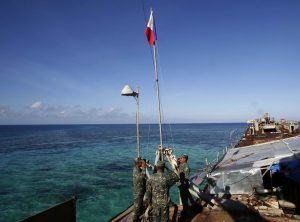The Philippine military has accused China of “aggressive and unprovoked interference,” claiming that Chinese personnel seized supplies, including food and medicine, that it had airdropped to an outpost in the South China Sea last month.
In a press conference yesterday, Gen. Romeo Brawner, the commander of the Armed Forces of the Philippines (AFP), played reporters a video that apparently showed two Chinese rigid hull inflatable boats and two rubber boats of the Philippine Navy rushing to pick up food supplies in the vicinity of Second Thomas Shoal in the Spratly Islands. He said that the alleged incident took place on May 19.
“We did four sorties or rounds of resupply. We were able to recover three of them. Unfortunately, one of the packages was intercepted by the Chinese, Brawner said. “It was the second airdrop where the Chinese came in.” The AFP says that it is not clear if the boats belonged to the China Coast Guard (CCG) or navy.
The supplies were intended for the small contingent of Philippine marines stationed aboard the BRP Sierra Madre, an old warship that was purposefully grounded on the shoal in 1999. Second Thomas Shoal and its rusting Philippine outpost have been the subject of growing tension between Manila and Beijing, as China has taken more and more forceful actions to prevent the Philippine Navy from resupplying the marines stationed in the Sierra Madre.
This has resulted in a number of incidents in which CCG patrol ships have rammed and fired high-pressure water cannons at the Philippine Coast Guard vessels and navy-contracted supply boats. In response to the loose Chinese blockade, Manila has adopted several different approaches to resupplying the outpost, including airdrop operations.
Speaking yesterday, Brawner said that the CCG believed that the airdrop involved construction materials to repair the Sierra Madre, and a Philippine Navy spokesperson said that the Chinese personnel on the boats tore open the packages and dumped the items into the water.
Nonetheless, Brawner denounced the action as illegal. “You’re not supposed to confiscate the supplies of another country,” he said, “even in war.” (Beijing has previously described the transport of construction materials to the warship as something of a red line.)
The May 19 incident first came to light after the Chinese government accused Philippine personnel aboard the Sierra Madre of pointing their guns at the CCG, releasing a blurry video that showed at least two men carrying what appear to be guns on the deck of the warship and then pointing them in the direction of the CCG. This was followed by Philippine media reports about the interdiction, and another incident in which CCG vessels harassed an attempted operation meant to provide medical assistance to marines who got on board the Sierra Madre.
Brawner said that the marines readied their weapons as a “precautionary measure” during the interception, which saw the Chinese boats come as close as five meters from the grounded warship.
“It’s part of the rules of engagement. That whenever you see imminent threats coming your way, you best be prepared,” Brawner said of the incident.
The incident is the latest sign of a worrying escalation of tensions between Beijing and Manila in the South China Sea, which has drastically increased the chances of one of the two sides making a misstep that tips them into conflict. This was a warning made by President Ferdinand Marcos Jr. in his address to the Shangri-La Dialogue in Singapore on Friday. Without naming China directly, Marcos denounced what he called “illegal, coercive, aggressive, and deceptive actions” in the South China Sea, which were undermining Southeast Asian countries’ vision for “peace, stability, and prosperity.”
In response to an audience question, he also laid down what can rightly be seen as the Philippines’ red line on the current maritime stand-off. “If a Filipino citizen is killed by a willful act, that is, I think, very, very close to what we define as an act of war and therefore we will respond accordingly,” he said. “And our treaty partners, I believe, also hold that same standard.”

































